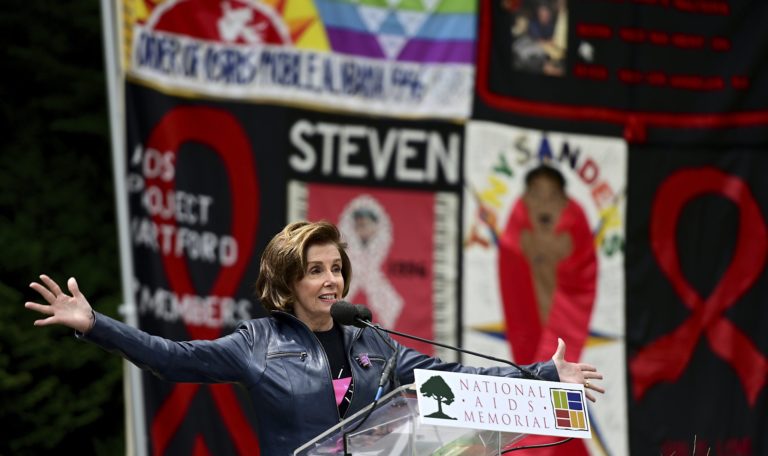

As the Bay Area anticipates the end of the COVID-19 pandemic, elected officials and people who led the fight against another global health crisis gathered in the National AIDS Memorial Grove on Saturday morning to mark the 40th anniversary of the first reported cases of AIDS.
The coincidence, and the contrast, was not lost on many of the speakers and guests at a private ceremony at the grove in Golden Gate Park.
“It’s odd to be coming out of a pandemic and reflecting on another,” said Joshua Gamson, a member of the National AIDS Memorial Grove board. “This is my first time in the grove since the pandemic, and I feel like I’m coming out of a cocoon and into the memories of the AIDS pandemic.”
“There are lots of flashbacks because of this pandemic, and the difference in response,” said Lou Hexter, an urban planning consultant from Oakland, who spent the 1980s working with the AIDS Project East Bay.
The federal response to both pandemics was criticized as slow, with Ronald Reagan in the White House in 1981 and Donald Trump in 2020, but the national death totals are not far apart — despite acquired immune deficiency syndrome being around for decades longer. The number of people who’ve died of AIDS in the U.S. as of 2018 is about 700,000, while the death total for COVID-19 is almost 600,000.
On June 5, 1981, the U.S. Centers for Disease Control and Prevention reported the first cases of a mysterious illness among gay men that would later become known as AIDS. It hit the Bay Area — and particularly San Francisco — hard, and the city mostly had to figure out on its own how to combat a disease that spread rapidly and disproportionately through the gay, transgender, Black and brown communities, as well as through drug users and sex workers.
“All of us considered disposable throwaway people by our federal government and by this society,” said state Sen. Scott Wiener, who said he “came of age as a gay man as a 17-year-old in 1987” and described it as “a terrifying time.”
Mayor London Breed said the federal government abandoned San Francisco at the start of the AIDS crisis.
“San Francisco was left on our own,” Breed said, “but we did what San Franciscans do best — we came together. … The system of care developed to help those struggling with HIV/AIDS was developed right here in San Francisco. The renowned research that continues to this very day was established right here in our great city.”
House speaker Nancy Pelosi, who hosted the first fundraiser for the now-famous AIDS Quilt, and pushed to get it displayed on the National Mall, said San Francisco’s compassionate, persistent and science-based approach to the crisis has helped the city, and the nation, in the battle against the coronavirus.
“Our mayor, she has just been a model for the rest of the country in how she has dealt with COVID, and I think theat her strength stems from the tradition and standards that we have here about caring for people, people caring for people. It’s not about someone talking down to us but people springing up.”
The impact of COVID has been felt unevenly across the country, with case and death rates, as well as regulations on masking, social distancing and gathering, varying by state.
Pelosi said AIDS activism has also served as a model for other campaigns, including the fights against breast cancer, for marriage equality and against the military’s former “don’t ask, don’t tell” policy that prevented gay people from openly serving.
“It all sprang from the AIDS activism and community coming from San Francisco,” she said.
While much progress has been made in the fight against HIV and AIDS, and drugs have been developed to slow its spread, people are still dying, speakers said. Pelosi credited President Joe Biden with committing $670 million in the coming year’s budget to combating AIDS.
Then the speeches and ceremony ended and a line of people formed to start the hours-long ritual of reading the names of the people who have died from AIDS. The names echoed through the memorial’s redwood grove and meadow, lined with panels of the AIDS Quilt.
Michael Cabanatuan is a San Francisco Chronicle staff writer. Email: mcabanatuan@sfchronicle.com Twitter: @ctuan